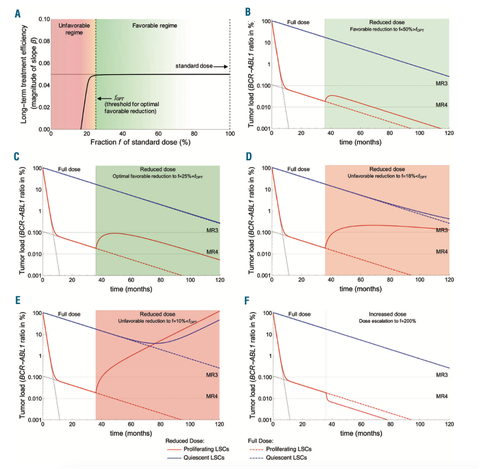Mathematical modelling of TKI dose reduction
General background: The use of thyrosine kinase inhibitors (TKIs) is a very effective therapy for the treatment of chronic myeloid leukaemia (CML). Although TKI therapy can control the disease for the majority of patients and the probability of survival is almost the same as that observed in an age-matched population of healthy people, it has not yet been shown that treatment with TKIs actually leads to a cure. Lifelong TKI treatment is still the default.
Specific Motivation: The possibility of discontinuing TKI treatment after a good and sustained response, as shown in various clinical studies, raises the question of whether targeted dose reductions (possibly before complete discontinuation) can lead to improvements in the success of therapy or to a reduction in side effects and costs.
Results: We use mathematical modelling based on ordinary differential equations (ODE models) to investigate the effect of dose changes. We were able to show that the therapy effect at the beginning of treatment is largely determined by the TKI effect. In contrast, the therapeutic effect at later time points is largely dependent on the ratio of proliferating and "dormant" leukaemic stem cells. This theoretically derived finding leads to the conclusion that TKI dose reduction after an initial reduction of the tumour burden is possible up to a certain level without a loss of efficiency of the therapy. These results were also commented on in an editorial (-> doi:10.3324/haematol.2018.201897) in the journal Heamtologica.
This project started as part of the prediCt-consortium (2018-2021) and is now beeing continued.
Scientists involved
- Prof Dr Ingmar Glauche
- Dipl-Biomath Thomas Zerjatke
- Christoph Baldow
- Dr Elena Karg
- Prof Dr Ingo Röder
Cooperation Partner
- Prof. Artur Fassoni (Univ. of Itjuba, Brasil / guest researcher at IMB)
Publications
Fassoni et al, DOI 10.3324/haematol.2018.194522
Roeder & Glauche 2021, DOI 10.1016/j.exphem.2020.11.006
Karg et al. DOI 10.3389/fonc.2022.1028871
Funding
EU/ERACoSysMed/BMBF (terminated); IMB budget

